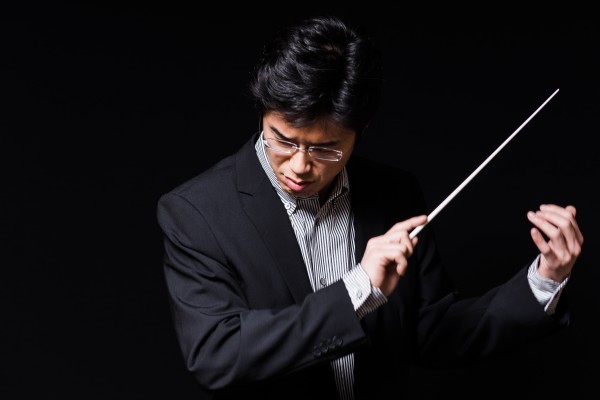Home > News
10/13/2015
Oregon Symphony resident conductor Paul Ghun Kim performs with Lang Lang - Q&A
By HOLLY JOHNSON // Upcoming performance to strike sentimental chord with former classmates
Young to be at the orchestral helm by any standard, Paul Ghun Kim, 34, resident conductor with the Oregon Symphony, has had a remarkable track record since early on. A native of Korea, he moved to the U.S. to attend Curtis Institute of Music at the tender age of 12, where he studied violin for eight years. He joined the Symphony in August, 2013. Kim began his conducting career at 18 as a faculty member at the Hartwick College Summer Music Festival.
Since he and the popular Chinese pianist Lang Lang were classmates at Curtis and knew each other there, Kim is a bit sentimental about the upcoming performance at the Arlene Schnitzer Concert Hall Oct. 15, which includes Dvorak's Symphony No. 8 and the Grieg Piano Concerto. "It's a really nice way to go back to where you started, basically. I get kind of sentimental about these things. Lang Lang knew me as a violinist, so this will be quite new for him, too."
In addition, he was the Assistant Conductor at Manhattan School of Music, the Aldeburgh Festival, the Peabody Institute of Music and the Jacobs School of Music. He has conducted in Poland and Canada, and won the Fritz Kreisler Award from the Curtis Institute of Music. Among other credits, he was a prizewinner at the 8th Grzegorz Fitelberg International Competition for Conductors. He received his Master’s Degree from Rice University and is a Doctoral Candidate at Indiana University.
We talked to Kim at the Oregon Symphony office about his life and career.
I read somewhere that of all the careers, conductors have the longest life spans.
Thank God! It's a lot of cardio, I know. You need to be able to express yourself as a conductor with your body. So your body has to be fit. That doesn't mean I exercise regularly, but conducting keeps me in shape.
Talk about your first connection to music.
My mother owned and operated a sort of (classical) music academy in Korea. She hired teachers to give lessons, and provided the space.Our home was actually inside those practice rooms. It was a way of life. I literally woke up to that music. I remember waking up to some horrible renditions of the Turkish March by Mozart on piano. That was the level of kids that came to study. I started on piano, but switched to violin, and stayed with it for a long time. That's what I studied at the Curtis Institute.
But mentally, I was always thinking, "I want to be a conductor. I WILL be a conductor. Since the age of seven. I don't know why. I think I probably saw someone conduct on TV.
It's interesting, the rich focus on Western classical music and the wealth of musicians coming out of Asia.
There is that focus. Not so common in the States. And it's in Russia. I think it was Jascha Heifetz who said that every kid in a Ukrainian village plays a violin....and that is when they saw so many of those great violinist come out of that area.
I think you have to consider the fact that Korea now is actually a remnant of the Cold War. There are just so many different cultures in Korea. The folk songs we learn as children are basically western. Those songs I sung when I was little, I didn't realize they were actually by Schubert, or Austrian or Russian folk songs. I'd listen to certain classical music and think, "This is so familiar." It happens a lot when I conduct composers like Dvorak, which we will be doing in the concert, or Russian music, which I did in my last subscription concert.
So you were young when you first entered Curtis?
I was probably too young. I was 12. I was the youngest one there, along with Hilary Hahn, who came later. I didn't take college courses until so much later.
How did that feel, as a kid to come to American and jump into studies?
It didn't seem all that foreign. It was just an extension of what I was doing in Korea. I had moved when I was 11, and spent a year preparing for Curtis. However, I didn't speak any English. I remember going to a private school in Philadelphia, and I didn't speak a word of English for three months. I just sat there: People probably thought I was mute. Then one day, my brain had an explosion. I could hear everything, I could understand everything, and I started speaking. Later, I was in the top of my class for spelling and grammar!
After Curtis?
I started in wander, spending time in Amsterdam close to the Royal Concertgbou Orchestra, one of the best in the world. I was enrolled in a conducting class there. I was in Vienna briefly. Then I returned to the US and went to conducting school at Rice University in Houston. From there, I went to Peabody, kind of hopping around from teacher to teacher. It wasn't until I actually spent one summer with the great conductor Lorin Maazel, that I got what I was looking for. He saw me conduct, talked to me, and immediately he knew what I needed. Right after that, I attended Indiana University, where I had the greatest experiences of my life, as a musician, a colleague, and as a conductor. Then this job opened up in Portland, and I applied.
It's like you're moving west, working your way back to Asia.
I do feel like that, in some way. Because I eventually want to be deeply involved in what's happening in Asia, especially Korea. It's a very cultured country, and I would like to go back to where I came from and share what I've learned. I haven't been back in 25 years. I've just been so occupied here.
Talk about the Oct. 15 concert program a bit.
This is all about fun and joy. Immediately when I heard Lang Lang was to be performing the Grieg Concerto, I thought about all that pieces that would go well with that. Immediately I thought of Slavic music. You have a very popular pianist playing an extremely popular concerto. It means celebration, festivities. That doesn't mean it's not serious, but it's something very inviting for the audience. It's more easy-going, which is exactly what the Dvorak Eighth Symphony is. Also we've got the Offenbach Overture to "Orpheus in the Underworld" as an opening.
What do you love about conducting?
I think ultimately being able to connect with people, to connect with many people at the same time. There's a certain satisfaction about everybody (musicians) understanding each other within that brief moment of musical excellence, understanding exactly what we're striving to do without talking. There's something very remarkable about that. It's like being in the army, in a way, working with the musicians, surrounded by your peers. You feel a great brotherhood, you know? Without the arms.
For tickets and information about this event, visit the symphony website.








